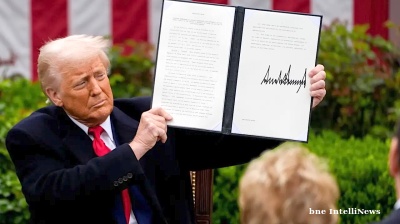Poland was plunged into constitutional crisis on December 3 after the country's Constitutional Court ruled that the new Law and Justice (PiS) government's attempt to alter its panel of judges is illegitimate.
The tussle over Poland's highest court - also known as the Constitutional Tribunal - began in late November when PiS sought to reverse the appointment of five constitutional judges by the previous Civic Platform (PO) cabinet. President Andrzej Duda, a former member of PiS elected in May, refused to swear in the appointees.
The new government continued engineering a friendly court on December 2, using its majority in parliament to vote through five new judges. The move provoked uproar from the opposition and some street protests in front of the parliament building. However, Duda swore the PiS appointees in at a late night ceremony just hours after the vote.
The opposition charges PiS with trampling on the constitution. It also claims the new government was establishing a dangerous precedent in which a majority in parliament would allow any ruling party to plant friendly people in every state institution. PiS has said that it must scrap the appointments rammed through by the previous administration in order to prevent the tribunal wrecking its policy programme.
The crisis hit a high point on December 3, when the Constitutional Tribunal itself ruled that three of the five rejected judges voted through by the previous parliament were legitimate, and therefore the president has a duty to swear them in. The remaining two were not eligible, it said; a consequence of PO's own manipulation of the constitution, for which it was also heavily criticised. The ruling also means the five judges put forward by PiS are not eligible.
PiS, however, says it will not back down. "The election of five judges stands," Parliament Speaker Marek Kuchcinski told TVN24 television. Other party officials insist PO flouted the constitution earlier this year when it passed a bill allowing it to appoint five judges instead of the three it had been scheduled to elect to the 15-seat tribunal. "PiS is trying to fix what PO broke," a government spokeswoman told reporters.
The standoff leaves the situation in chaos. In effect, the country's highest court now has two rival groups of judges, each questioning the legitimacy of the other.
Growing divide
The situation suggests PiS' pulled off something of a sleight of hand in its election campaign. Wary of the reputation for extremism it garnered during its last term in power in 2005-07, the party successfully presented a much moderate image, pushing less divisive figures such as the new prime minister, Beata Szydlo, to the fore while chairman Jaroslaw Kaczynski avoided the spotlight. Other controversial figures such as Antoni Macierewicz were also sidelined.
Some commentators suggested that PiS had learned its lesson from its shortened term, and predicted it would act with more caution this time around. Once in power, however, PiS has sought to establish its rule with a speed efficiency that has the opposition and commentators fretting over the fate of Polish democracy.
President Duda has also attracted controversy due to his pardon of the new minister overseeing secret services. Mariusz Kaminski was earlier barred from public office for abuse of power. Macierewicz has now been appointed defence minister. Meanwhile, a bloodbath appears to be on the way at the country's state-controlled companies.
Kaczynski's role is also a cause for concern. Outside the official government currently, he is assumed to be pulling the strings from behind the stage. Reports suggest Szydlo was on holiday when the new cabinet was being selected. During PiS' last term in office, Kazimierz Marcinkiewicz was placed in the PM's chair for a matter of months before he was unseated and Kaczynski took over.
"PiS's conduct suggests that the party is not shy of bending rules to secure appointments of party loyalists to key institutions in order to circumvent potential opposition to its reform program," Otilia Dhand at Teneo Intelligence says.
PiS officials have not been shy of making the connection public when it comes to the Constitutional Court. "The tribunal could block our legislation, such as lowering the retirement age," Speaker of the Senate Stanislaw Karczewski said in late November.
Dhand suggests the rising conflicts will only antagonise growing splits in Polish society. During the election campaign, PiS skillfully tapped into the reactionary mood reaching across Europe, and the growing divide in Poland between the major cities and a conservative and strongly Catholic electorate mainly based in rural areas, by painting PO as a party of elite liberals, out of touch with ordinary Poles left behind by the country's economic progress in recent years.
"One risk to watch in the coming weeks is the likely emergence of anti-government protests in reaction to the constitutional crisis and the PiS' suggestions that it would seek to assert control over media," Dhand warns. "At the same time, PiS's supporters may stage counter-protests, adding onto the increasing polarization of Polish society."
News

European foreign ministers hit out at Georgian ruling party
Statement condemned ongoing democratic backsliding by the ruling Georgia Dream party, which has consolidated power via crackdowns on independent media, NGOs, activists and opposition politicians.
_1752493253.jpg)
RSF urges EU action over police violence against journalists in Serbia
Press freedom watchdog Reporters Without Borders warned abuses threaten the country’s EU accession process.

US and Panama launch joint military exercises amid canal security concerns
US helicopters have arrived in Panama to begin collaborative training exercises with local security forces, as tensions mount over the strategic waterway's future amid competing US and Chinese interests.

Migration pushes EU population to record high, but CEE countries continue to shrink
Immigration outweighed the natural population decline in 2024 in just three of the newer EU member states – Croatia, Czechia and Slovenia.



